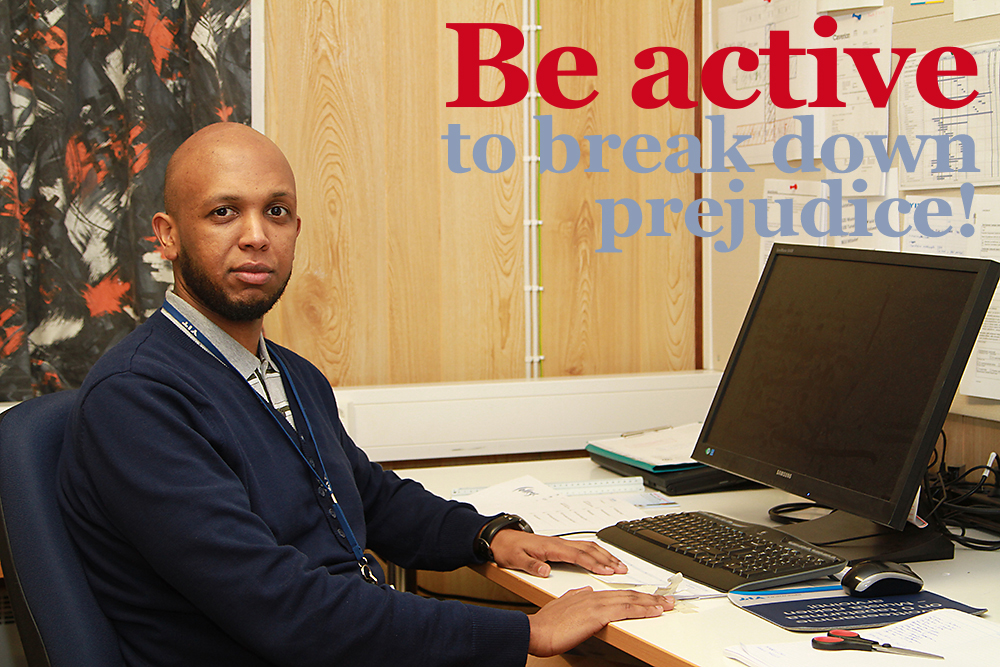
Construction engineer Ahmed Ibrahim encourages immigrants to be active in seeking jobs.
“Don’t be discouraged. There are alternatives.”
Photo Päivi Arvonen
By Päivi Arvonen
Construction engineer Ahmed Ibrahim encourages immigrants to take an active stance. He has noticed that his fellow workers’ reserve usually disappears in six months.
On the phone, 30-year-old Ahmed Ibrahim sounds like he learnt Finnish as his native language. He came to Finland with his parents at age 10. Born in Somalia, Ibrahim also lived in Yemen in his childhood. In Finland, he learned to speak Finnish with a woman living in a downstairs apartment. He was also helped by his English-teacher father, who had lived in Finland earlier and encouraged his son to study the language.
“I’m a Somali living in Finland. I have learned to behave like a good Finn, and I’m a Finnish citizen,” Ibrahim says describing his national identity.
On arriving in Finland twenty years ago, he started school on the 4th grade of comprehensive school corresponding to his age level. After the upper stage of comprehensive school, he moved on to general upper secondary education. He completed his compulsory military duty at the Santahamina base in Helsinki. Next, he studied construction engineering at the Kymenlaakso University of Applied Sciences. His diploma work led to his current job as a foreman at the construction company YIT Rakennus Oy.
“Naturally life in Finland is somewhat harder for a person with dark skin than for native, light-skinned people. Then again, life is harder for light-skinned than for dark-skinned people in many countries including Somalia,” Ibrahim says.
He admits that immigrants face prejudice in Finland.
“But you can break down prejudice by taking an active stance.”
Ibrahim has noticed that fellow workers in new construction projects first treat him with some reserve.
“Their reserve disappears in six months, and we then relate to each other normally.”
Employers show flexibility for religion
Ibrahim is a Muslim. The Friday Prayer at a mosque is very important for him.
“I have always managed to make arrangements with my employers. I visit a mosque at noon on Friday and compensate for the lost work time at some other time.”
Ibrahim has found that Finns respect other religions and cultures.
“Finland is a good and safe country to live in. You don’t have to fear anything here. Basic things like housing, education and transport are well organized,” Ibrahim says.
Immigrants need support from the very beginning
Ibrahim is annoyed that the media usually report only negative aspects about immigrants.
“Finns should consider how Finland could benefit more from immigrants. Most immigrants are good and honest people who work and pay taxes.”
Ibrahim suggests that immigrants should be helped from the very beginning to adjust to Finland and Finnish culture.
“Information would benefit immigrants the most when given by representatives of their own cultures. Practical advice is more valuable than financial support. It would be important for immigrants to start off their new lives in Finland on the right foot, so they wouldn’t have to wonder ten years later what went wrong.”
Ibrahim lives in Käpylä. He appreciates Helsinki’s public transport, sports opportunities and nature. “Helsinki is a good-sized, multi-cultural city. Racism is decreasing. The current trend is good. Many Finns are increasingly international and tolerant.”
Translated by Johanna Lemola


